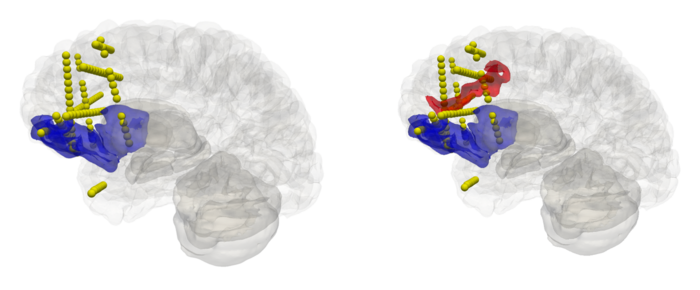Researchers of the Human Brain Project (HBP) have published a new study in Science Translational Medicine presenting advanced brain modelling methods for epilepsy clinical care. The article, which is featured on this week’s cover of the journal, describes the methodology used in the EPINOV clinical trial (Improving Epilepsy surgery management and progNOsis using Virtual brain technology). The personalized brain modelling approach has been developed over several years in the HBP, and is supported by the digital research infrastructure EBRAINS.

Credit: V. Jirsa
Researchers of the Human Brain Project (HBP) have published a new study in Science Translational Medicine presenting advanced brain modelling methods for epilepsy clinical care. The article, which is featured on this week’s cover of the journal, describes the methodology used in the EPINOV clinical trial (Improving Epilepsy surgery management and progNOsis using Virtual brain technology). The personalized brain modelling approach has been developed over several years in the HBP, and is supported by the digital research infrastructure EBRAINS.
To create personalized brain models, the researchers use a simulation technology called The Virtual Brain (TVB), which HBP scientist Viktor Jirsa has developed together with collaborators. For each patient, the computational models are created from individually measured anatomy, structural connectivity and brain dynamics data.
For epilepsy, the approach is currently being tested in a large-scale clinical trial to provide a computational, predictive tool in surgery preparation
Even though for many patients, epileptic seizures can be controlled by drugs, almost one-third of patients do not respond to medication. For this group, surgical removal of the epileptogenic zone, the brain area from which the seizure originates and propagates, presents the only treatment option. Currently, the procedure has a 60% success rate.
The TVB technology enables clinicians to simulate the spread of abnormal activity during epileptic seizures in a patient’s brain, helping them to identify the target areas better. The simulations are personalised for each patient, effectively providing a virtual epileptic patient (VEP) tailored to each individual real one. The approach has been tested in several retrospective studies, the latest one published this year in Epilepsia. The clinical trial is expected to run until 2025.
Ongoing work in the HBP uses the EBRAINS research infrastructure to further improve the method’s predictive power with new high-resolution data from the HBP’s multilevel human brain atlas. “Computational neuromedicine needs to integrate high-resolution brain data and patient specificity,” explains Jirsa. “Our approach heavily relies on the research technologies in EBRAINS and could only have been possible in a large-scale, collaborative project such as the HBP.”
Journal
Science Translational Medicine
DOI
10.1126/scitranslmed.abp8982
Article Title
Delineating epileptogenic networks using brain imaging data and personalized modeling in drug-resistant epilepsy
Article Publication Date
25-Jan-2023
COI Statement
V.J., F.B., and M.G. hold a patent “Method of modulating epileptogenicity in a patient’s brain (patent no. 11191476)”. V.J., F.B., H.E.W., M.W., and M.G. are shareholders of VB-Tech (Virtual Brain Technologies). The other authors declare that they have no competing interests.




